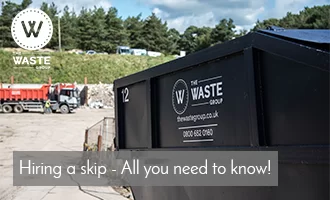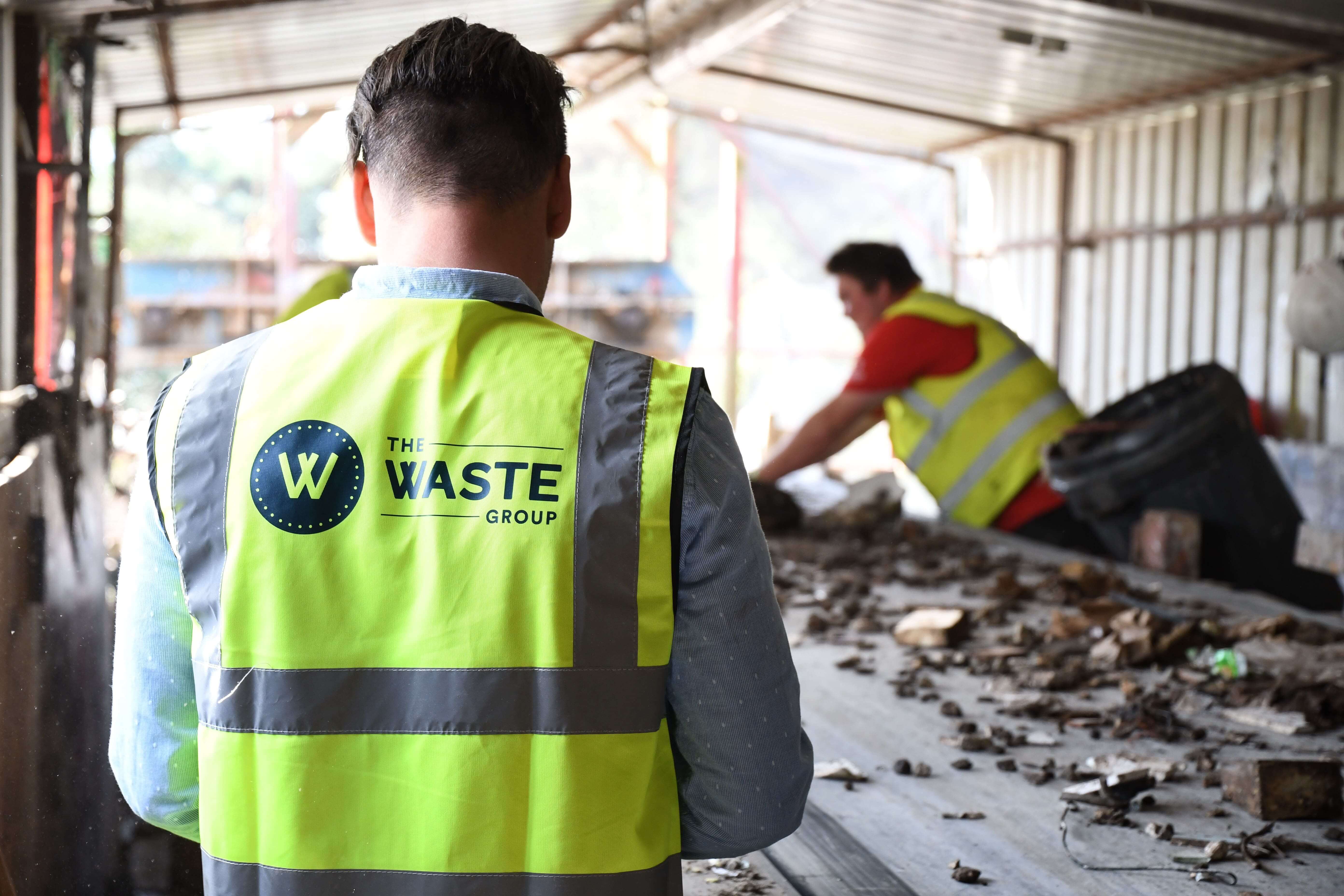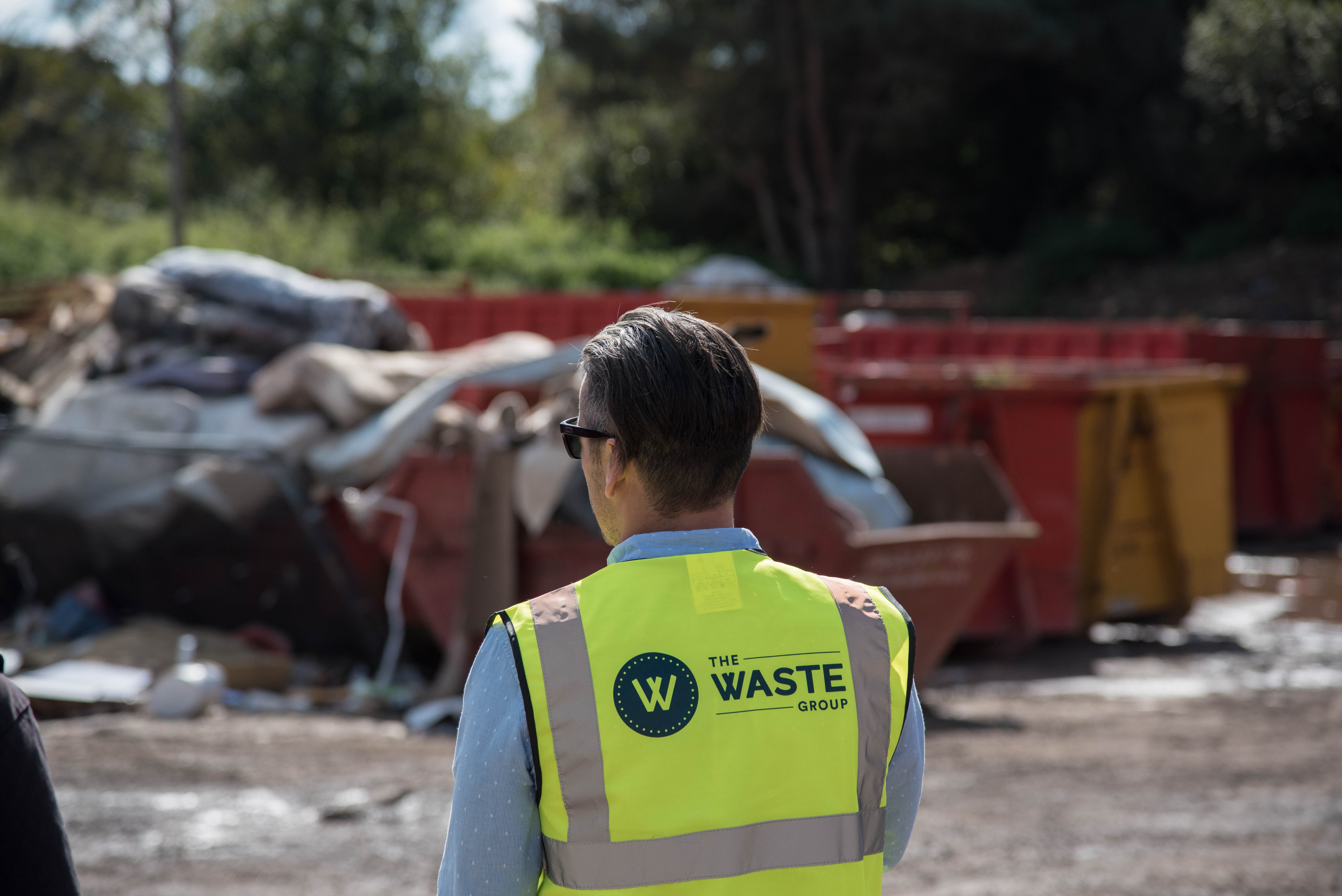What you can and can’t put in a skip

Are you tired of overflowing rubbish bins or multiple trips to the landfill? Skip hire in the UK offer a powerful one-stop solution for waste removal.
Whether you’re doing an office cleanout, home renovations, or construction project, these handy containers are perfect for removing waste and other unwanted items.
Skips come in various sizes, making them the ideal waste solution for projects of any scope. But keep in mind that when hiring a skip, choosing the right size is crucial for maximising its efficiency and avoiding unnecessary costs.
Now, you may wonder if a skip suits the type of waste you want to dispose of. Waste regulations and processes can vary between skip hire companies, and there’s no one black-and-white answer to this question.
But we can tell you for sure what rules we have in place here at The Waste Group. This guide provides a comprehensive list of the wide variety of waste materials you can dispose of when you hire a skip from us.
We’ll also share some important information about the types of waste you’re generally prohibited from placing in skips and alternative disposal methods for these items.
Categories of waste accepted in skip bins
Skip bins are a flexible solution for various waste management needs. At The Waste Group, we permit a wide range of waste types to be disposed of in our containers, including;
- Household waste: Everyday household items like furniture, appliances, and general household clutter.
- Green waste: Green waste from gardens, including branches, grass cuttings, leaves, and other organic materials.
- Construction waste: Materials like bricks, concrete, tiles, and other building debris.
- Renovation waste: Items for renovation projects, including drywall, flooring, roofing materials, and insulation.
- Commercial waste: Various commercial waste items like office furniture, equipment, and packaging materials.
- Industrial waste: Waste from manufacturing processes, including scrap metal, wood pallets, and packaging materials.
- General waste: Miscellaneous items that don’t fit into specific categories for meeting overall waste management needs.
Different skip types
When you hire a skip from The Waste Group, you must specify the type of waste you’ll be disposing of. Remember, it’s important to avoid overloading skips for efficient and safe waste removal.
We offer several skip options, and you must choose the one that best aligns with your waste needs:
- General
- Inert (bricks, rubble, soil, and stones)
- Wood
- Metal
- Plasterboard
What You Can Put in a Skip
Metals
- Pipes
- Fixtures (e.g., faucets, handles)
- Scrap metal
- Aluminium
- Copper
- Steel
Wood
- Timber
- Pallets
- Lumber
- Plywood
- MDF (Medium-Density Fiberboard)
- Particleboard
Non-hazardous materials
- Plastics (e.g., containers, packaging)
- Cardboard
- Paper
- Glass (e.g., bottles, jars)
- Rubber
- Textiles (e.g., clothing, fabric scraps)
Construction debris
- Bricks
- Concrete
- Tiles
- Roofing materials
- Insulation materials
Green waste
- Branches
- Grass clippings
- Leaves
- Shrubs
- Garden trimmings
- Hedge cuttings
General waste
- Furniture (e.g., Sofas, Chairs, tables, mattresses)
- Old toys
- Broken tools
- Renovation waste (e.g., carpet, flooring)
- Packaging materials (e.g., cardboard boxes, plastic packaging)
- Old clothes
- Other miscellaneous items
Special considerations
At The Waste Group, we strongly emphasise responsible waste management and ensure that all waste materials are managed correctly. Here are some specific items that require special processes for disposal:
Plasterboard
Plasterboard, also known as drywall, is a common building material that needs to be disposed of separately, because it needs to be recycled.
To guarantee proper plasterboard recycling, we kindly ask customers to separate plasterboard from non recyclable waste materials by putting it in a separate container. This allows us to arrange for its appropriate disposal.
Garden soil
When removing large amounts of garden soil, you must take factors like weight limits and potential environmental impact into account.
While small amounts of garden soil can generally be disposed of in containers with other garden waste, it’s essential to avoid mixing it with other types of waste, such as construction materials or household items.
We recommend customers tell us in advance if they intend to dispose of large amounts of garden soil. This gives us time to prepare for responsible disposal.
What You Can’t Put in a Skip
Certain materials are prohibited from being disposed of in skips due to environmental and safety regulations. If improperly handled, these materials pose potential hazards to health, safety, and the environment. Here’s an overview of the types of materials that are typically not allowed in skips:
Hazardous waste
Substances like asbestos, chemicals, paints, solvents, pesticides, and batteries are strictly prohibited from being thrown into skips due to their potential health risks and environmental contamination.
Electrical appliances
Skip disposal is off-limits for electrical devices containing hazardous components. For example, refrigerators, air conditioners, televisions, and fluorescent light bulbs. These items contain harmful materials like refrigerants and mercury that require special handling.
Tyres
Tyres are typically prohibited from being disposed of in skips due to recycling regulations and environmental concerns. If not properly disposed of, tyres can release harmful chemicals.
Medical waste
Waste from medical facilities, including syringes, needles, and medical equipment, must be handled using specialised methods, are unsuitable for skip disposal as they pose significant health and safety risks.
Asbestos
Finally, asbestos-containing materials like insulation, roofing tiles, and siding are not allowed in skips because of the health hazards linked to asbestos exposure. Proper procedures for removing and disposing of asbestos are necessary to handle these materials safely.
Handling Prohibited Items
Recycling centres
Skip bins are not suitable for all recyclable items. But recycling centres offer an alternative way to reduce waste going to landfills and support environmental sustainability.
These centres conveniently accept materials including metals, paper, cardboard, glass, and plastics. Contact your local recycling centre to find out which materials they accept and where you can drop them off.
Local council services
Most local authorities provide specialised services for disposing of items that can’t go in skips. These services often include designated days for hazardous waste collection and pickups of bulky items.
Specialist waste companies
There are specialised waste management companies that handle specific types of waste. For instance, hazardous materials, electrical appliances, or medical waste.
These experts have the knowledge and resources to guarantee that prohibited items are disposed of safely and in compliance with regulations.
Get in touch with experts
If you’re still not sure how to get rid of certain prohibited items, feel free to reach out to your skip hire provider or local council for help.
They can advise you on the right ways to dispose of these items, and they might suggest specialised waste companies or recycling centres nearby.
Seeking help from professionals ensures that prohibited items are disposed of properly and responsibly, reducing environmental harm and supporting sustainable waste management efforts.
Choosing the Right Skip Hire Service
When picking out a skip rental service, it’s crucial to take into account various factors to make sure you find the ideal match for your needs. Here are some important points to keep in mind:
- Size options: Determine the right skip size based on the volume and nature of the waste you intend to get rid of. Skip rental services typically offer a range sizing options, from small mini skips to larger roll-on, roll-off skips.
- Permit requirements: Depending on where you plan to place the skip, and whether it’s for commercial or domestic use, you may need to obtain a permit from your local council. Check with the skip hire service to determine if a permit is required, and if they can help you get one.
- Delivery and pickup: Consider the convenience of delivery and pickup times provided by the skip provider. Select a company that can accommodate your schedule and deliver a punctual and dependable service.
- Customer support: Assess the quality of customer support offered by the company. Ultimately, you want a service that’s prompt in responding to inquiries, presents transparent pricing, and offers useful guidance and support throughout the process.
Questions to ask when choosing a waste provider
The following questions are a great way to assess whether a skip company is the right choice for you.
- What skip sizes do you have available, and which one would you suggest for my waste needs?
- Will I need a permit to place the skip on public property, and could you help me in obtaining one if necessary?
- Can you share your delivery and collection times, and can you accommodate my preferred schedule?
- Are there any limitations on the types of waste that can go into the skip?
- Could you provide details on your pricing plans, including any extra charges or fees I should be aware of?
- How do you manage recycling and disposing of waste materials?
- What actions do you take to promote environmental sustainability and compliance with regulations?
- Do you have references or testimonials from previous clients that I could look at?
- What safety measures do you implement during skip delivery, placement, and collection processes?
Closing thoughts
To sum up, skip bins provide a handy way to manage waste in different projects, but it’s important to pick the correct size and be aware of waste regulations. Although skips can handle a variety of materials, there are certain items that are not allowed due to safety and environmental hazards.
You can usually dispose of prohibited waste items at recycling centres or by working with specialised waste companies. When choosing a skip hire service, it’s essential to consider factors like available sizes, permit requirements, and the quality of customer service.
By making well-informed choices and following proper disposal practices, we can help maintain a cleaner and more sustainable environment.
Choose The Waste Group for your waste removal needs
Ready to tackle your waste removal needs with ease and efficiency? Look no further than The Waste Group, your local skip hire experts serving a wide range of locations in Poole, Bournemouth, Dorchester, Weymouth, and Dorset.
Whether you’re looking for a small skip to hire for a garden clearance, or you need a larger skip for a full home renovation – we can help.
With over a decade of experience in the industry, our fleet of new skip lorries promises prompt delivery every time. Choose from our range of skip sizes, from 4 to 12 yards, and roll-on, roll-off bins ranging from 16 to 40 yards.
The Waste Group prioritises customer satisfaction, delivering excellent service to every valued customer.
We know that ordering a skip for the first time can be daunting. Let us help you simplify the process.
Get in touch with us today to streamline your waste management process!



